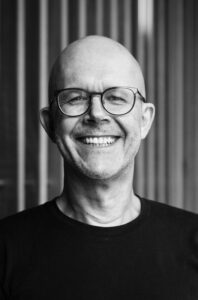In this piece, you can read a short discussion between Sterre de Boer and Dr. Piguet that took place during the 2022 Australian Dementia Network conference.
Interview Olivier Piguet
Born and raised: Geneva, Switzerland
Currently based: Sydney, Australia
Favorite beach in Sydney: Clovelly
Favorite band/music artist: Frank Zappa and the Beatles
If you could relive any conference, which one would it be: “AAIC
(then known as ICAD) Amsterdam 1998, my first big conference I
attended, having welcoming drinks next to the “Nachtwacht” in the
Rijksmuseum whilst meeting John Hodges and Suzanne Corkin…
Can’t get better than that”.

Photo and interview by Sterre de Boer
Prof. Dr. Olivier Piguet is a NHMRC Leadership Fellow and Professor of Clinical Neuropsychology, the director of FRONTIER, the frontotemporal dementia clinical research group, immediate Past President of the Australasian Society for the Study of Brain Impairment and the President elect of the International Society of Frontotemporal Dementia (ISFTD). He describes himself as a “real Swiss in Australia”, even though he moved from Switzerland to Australia over 30 years ago.
He originally moved to Australia for his Master’s degree of Clinical Neuropsychology at the University of Melbourne. He continued his training as clinical neuropsychologist in Geneva during a mandatory return to Switzerland (due to visa issues) and upon return in Australia in Sydney. He first worked as a clinician in traumatic brain injury rehabilitation and later focused on dementia related topics which resulted in his PhD on “Executive functioning in elderly community dwellers”. During his PhD, he still worked full-time as clinician to pay the bills in Sydney. Between 2003-2005 he completed his postdoctoral fellowship at MIT in Boston under supervision of Suzanne Corkin. Whilst investigating emotional memory at MIT, he got the chance to meet and study famous patient HM, which increased his interests for memory processes, emotional functioning and dementia related disorders even more. Upon return in Sydney, the FRONTIER research team, with a special focus on Frontotemporal dementia, was established which got him involved with FTD research. He is now the director of the FRONTIER group.
From a young age he was fascinated by the brain, in particular the developmental psychology. How can people learn? A (under)graduate psychology gave him a theoretical answer, but for Piguet that wasn’t enough, the answer had to be grounded in the brain and thus he tried to find the answer by studying physiology, anatomy and neurosciences and by completing a variety of different placements such as pediatric psychology, general neurology and geriatric care. The latter placement resulted in his fascination for people, their life story and personality. How can a neurodegenerative disease change that all of a sudden? The neuroscientific questions he asked might have changed over the years, but his meticulous methods to answer them did not. “Do you find it frustrating you don’t have all the answers yet after so many years”? Certainly not, he answers: “I am also a clinical neuropsychologist, even without a treatment you can help patients and support their caregivers, I am happy I can contribute and help from both a clinical and a scientific perspective”.
When asked to reflect on his scientific careers, he considers himself lucky; “I was lucky enough to be born in a country that offered free education and therefore I could go study psychology straight after high school. I am grateful for the opportunities that I got during my academic trajectory”. But it is not just luck. It was also hard work: “there were periods that I had to take on numerous jobs outside academia to pay for the bills whilst I was trying to complete my PhD. But looking back, these tough times also helped me to reflect and put life in perspective, even to this day”. So, a little bit of luck and a lot of hard work is all it takes? “Haha no! Building a network, meet with fellow researchers and knowing when a great opportunity is in front of you and making sure you grab onto it, is crucial”, he quickly adds. He also highlights the importance for (future) PhD students to make sure you find a mentor that you enjoy working with and you can see collaborating with for 4+ years and most importantly, choose a topic that really motivates you. This also works vice versa: “nowadays, being a mentor myself, my PhD students and colleagues motivate and inspire me every day”.
Speaking of motivation, why did you wanted to become the new President-elect of the ISFT? Piguet: “I think the ISFTD has arrived at a crossroad. We have so much intellectual knowledge and collaborations within the society, it is important we use that to its fullest capacity with innovative ideas. It is great to see ISFTD president John van Swieten to take this huge task on with such great enthusiasm and energy, I am excited to be part of that change”.
With that said, the interview comes to an end. Time for me to go back to the Australian Dementia Network conference in Queensland, where the interview took place, and time for Professor Piguet to attend his late and early hour zoom calls with Europe and America… The ‘down’ side of being ‘down’-under.

